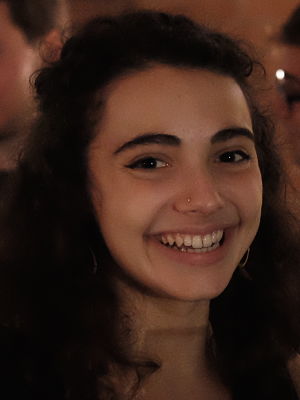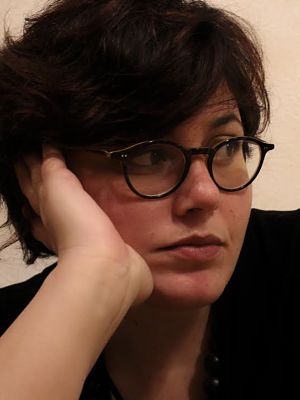Language Matters
[translated fiction]
Just a moment please (they all look at me: they’re recent graduates, twenty-four, twenty-seven years old), then you can try out the program and do what you have to do, but before you download it be aware that it isn’t compatible with Macs or the latest version of Windows. So, if you’re using a Mac or the latest version of Windows, take this flash drive and install the Virtual Machine I’ve prepared for you. Do you all know what a virtual machine is? You all know? Yes? No? Yes? On the count of three: one two three? (they laugh). I’ll take that as a no. Okay, let’s take a coffee break and then we’ll get back to the virtual machine.
* * *
Involuntarily, in life, we think proportionally. When you know someone much worse off than you, when you see a bomb go off on TV on the other side of the world, everything that you’ve been through is no longer proportionally relevant on the scale of human suffering and you tell yourself I am, for the moment, lucky. It doesn’t really matter how much you’ve suffered: you’ll still always be luckier than someone else, and no matter who you are you’ll still feel the subtle relief and twinge of guilt at having avoided misfortune.
Years ago I taught Italian to foreigners. I stopped because etcetera etcetera. But I don’t want to talk about me; I want to talk about them. It’s an undefined them, because I don’t know anything about them—I met them in a classroom where, as I said, I taught Italian. We called them “migrants.” Some of them didn’t know how to write, so the problem was using a pen or pencil, making some symbols and giving those symbols a meaning. But that turned out to be a secondary problem. The first issue was how to pronounce it, this language of salvation: “mi chiamo” (my name is), “vengo da” (I’m from), “ho bisogno di” (I need), “non mi sento bene” (I don’t feel well), “mi fa male qui” (it hurts here), “quanto costa” (how much for), “pane” (bread), “sto cercando” (I’m looking for), “mi può dare indicazioni per” (can you give me directions to), “lavoro” (work), “grazie” (thank you), “per favore” (please), “prego” (you’re welcome). Others knew how to write, and of course they understood more quickly. In certain classes, at a certain point, there were also study-abroad students who had just arrived in Italy. They wanted to supplement their courses at the university and so they showed up at the center. The problem was that they asked too many questions: they came from foreign universities and they wanted to know the whys and the hows, why that ending was like that and how you used that saying and in what context. Some of them helped the ones who couldn’t write; some became friends and everything mixed together, the boy from Oslo and the girl from Eastern Europe and the boy from Africa-who-knows-where. There was the issue of deciding whether we should have mixed classes with migrants and students—with all the educational advantages of that setup—or whether we should isolate the university students in a specialized class so that neither group felt uncomfortable. There were those of us who said that the center couldn’t take on the study-abroad students, because if the study-abroad students had the money to come all the way here and take courses at the university they should take a private class. Then there were those who said that’s not true, they have tiny scholarships and who are we to say they’re rich; we should just teach everyone without distinction—and so on and so forth.
I never asked any of them why they were here: not the ones we called study-abroad and not the ones we called migrants. I never asked how they got here—I only know that a couple of them were waiting for news about their situations, and some would take the exam at a certain point.
In class there was an Asian girl: she never spoke (how could she have?) and she nodded yes even when she obviously didn’t understand. The first day I asked her to show us her country of origin on the map, pointing first at her and then the map, smiling, as if to say tell us, explain to us, we’re curious, but she wasn’t able to find it. They told me she came from ___, but that they knew next to nothing about her.
I never asked any of them why they were here: not the ones we called study-abroad and not the ones we called migrants. I never asked how they got here—I only know that a couple of them were waiting for news about their situations, and some would take the exam at a certain point. My task was not to know what they would do later, because I would never know anything about them in the coming years; my task was to teach them—in that very moment and on their different levels, in the most simple and concise way—how to survive here linguistically. So that, despite everything else, they could leave that classroom with a language of survival. I only knew tiny things about them, which I deduced from their lateness (the lady she took care of had had a problem), from their hands (he built houses starting at dawn and in the evening he came to class), from their gratitude (handshakes, smiles, their eager requests to know more, to see if that exercise was correct—but the gratitude should have been all mine), from their eyes (a woman who brought her infant with her, not knowing who could take care of him during class: she took notes with one hand, and with the other she rocked her baby: the baby—he must have been four, five months old—couldn’t know or understand; he would cry the universal cry and she would apologize, as if the crying disturbed us: so I would speak with whimpers in the background, and then with wails. I would smile, looking at the child; I would say poor thing, he has a point. We all understood that cry: it was the cry of survival. Of course, we understood only that there was something wrong, but we didn’t know what: could it be that he’s teething? Could it be that we’re speaking too loudly? Could it be that he’s hungry? And all of us, along with his mother—she, more astutely—would each make our own hypotheses).
* * *
Are we all back? We were talking about virtual machines: basically, they’re programs that create a virtual environment, emulating things on your computer that are not, let’s say, typical of your computer. They pretend. Our virtual machine will emulate an operating system on another operating system. Got it? This way we’ll be able to open and use our program, which wasn’t designed for certain operating systems, and we’ll make it run on another operating system. So, we’re essentially tricking the machine? the student in the last row asks me. In a way, yes, we’re tricking it, I answer. With a clever little ploy, we make it use a language that isn’t its own without it realizing.
* * *
Life is a matter of proportion and particulars. You decide whether you want to look at everything all together or sink into specifics: whether you’d rather consider certain aspects or others. Generally, when we go from the big to the small we tend to lose ourselves, and to find our way again it’s best to break our problems down into small pieces and then get back up.
Whatshername was hospitalized and placed in the ___ ward for ten days or so, and there she could essentially do nothing. Her freedom was curtailed by the ward’s rules, which weren’t written down anywhere: it’s not like you get there and they read you your Miranda rights. When you’re checked in, and then step-by-step over the following days, you learn what to do without asking questions: it took Whatshername a couple of days to ask for some tape to replace the shoelaces they had taken from her when she checked in. With the tape she could walk normally in her tennis shoes, feeling them grip her feet the way they should. The nurses respected her because, unlike the other patients, when she managed to speak, she spoke well: she used complex language, she knew all the difficult terms, she understood the concept of therapy.
In there, Whatshername had to ask for anything and everything: her lighter to smoke, her charger for her cellphone—and she had to eat with the others even though she had asked not to. The first few days, in fact, she didn’t eat at all, and they said all right miss, if you won’t eat with the others we’ll have to give you an IV, because you need to eat with the others; it’ll do you good to be around the others. So, one morning, convinced by her hunger pains, she got up and went to the dining hall, and she ate with horror in front of a misshapen man as he yelled in her face. The nurses said don’t worry, he isn’t dangerous. She said to herself all right, you want me to be with the others? I’ll show you all how it’s done and you’ll have to deal with the consequences. And so, her parallel life began: she put her body in hospital mode—without thinking about how her body would have reacted if it had realized that it was in reality mode—and then she was able to survive and exist, with all the educational outcomes of that setup.
Some nurses had brought a shouting thing on a stretcher into her room: an animal, a flailing rag. They slammed the rag onto the bed and the rag didn’t want to take off its coat; they strapped it down and the rag was yelling, it was speaking an incomprehensible language, and then they gave it an injection, shouting enough, that’s enough, calm down, that’s enough, and the rag lost consciousness, transformed into a freeze-frame shot.
One night, Whatshername opened her eyes and heard yelling. Some nurses had brought a shouting thing on a stretcher into her room: an animal, a flailing rag. They slammed the rag onto the bed and the rag didn’t want to take off its coat; they strapped it down and the rag was yelling, it was speaking an incomprehensible language, and then they gave it an injection, shouting enough, that’s enough, calm down, that’s enough, and the rag lost consciousness, transformed into a freeze-frame shot.
She watched from the other side of the room without understanding, still and unperturbed, merely foggy and tired. The next day she woke up to the light coming in. Every day it took her a few seconds to remember that she was hospitalized in the ___ ward. Waking up was the scariest moment. She rolled onto her side and saw a motionless girl with Asian-looking features, her eyes open, completely strapped to the bed. I didn’t dream her, she said to herself, but due to matters of proportions and particulars she didn’t go near her for the whole morning.
* * *
Life is made up of proportions, particulars, and chance. Three hundred and three kilometers away from the classroom where the computer-programming course was taking place, Elisa’s father was being diagnosed with cancer. Francesca’s mother was in the hospital three hundred and sixty-three kilometers away, and the other Francesca was three hundred and seventy kilometers away and six months pregnant. One thousand and fifty kilometers away, in the sea, a boat with two hundred people on board was approaching the Italian coast. Two hundred and seventeen kilometers away from that classroom the politician Salvini was making another racist declaration. Three hundred and fifty kilometers away someone was in a church, inserting a coin into a candleholder. On the other side of the world, more than eight thousand kilometers away, someone entered a nightclub and started shooting. Four hundred and eighteen kilometers away from that classroom my Asian student was not among the other students: she was absent once, then again, then yet again, and no one knew what had happened to her. In a bar fifty meters away, people were gearing up for the soccer game. A bird, on the A1 highway, was run over around the exit for Roncobilaccio. At the same time, someone was swallowing a Xanax before their meeting. A professor was reading Adorno, Minima Moralia; he was handing out photocopies on Hannah Arendt; one of his students was sticking a piece of gum under their seat. Someone was losing his job, someone was finding out that he was going to be a grandfather, someone was naked in front of the TV with a Heineken in hand. None of these people knew about the others: everyone was living, ignorant of the proportions, the particulars, and the chance of others’ lives.
* * *
How did you do it? the stunned nurses asked her. Are you using the informal with me because my shoes are held together with tape? Do you think I walk around with tape on my feet when I’m not in here? How do you think I did it? said Whatshername, who left the infirmary and went back to her room to hide under the covers.
Life is made up of proportions, particulars, chance, and actions. No one knew anything about this Asian girl. She had no identification in her suitcase and when they brought her to the ___ ward no one knew what to do, as if there were no protocol for these cases. They didn’t even know which interpreter to call: they knew she was Asian but she was crying nonstop—she wasn’t explaining herself. They sedated her and tried to convince her to take off her coat, but they didn’t take it off of her themselves; she kept yelling and they sedated her again. She didn’t want to give them her arm to draw blood, and they weren’t able to use a stethoscope to listen to her heartbeat. Everything came to a halt, and it wasn’t clear why they weren’t following protocol.
* * *
In the afternoon Whatshername gets up and goes over to the Asian girl’s bed. She points to her heart with one finger and says I’m Emma. Then she points to the girl and raises her eyebrows, as if to say and you? Tell all of us in the ___ ward, tell us because we’re all curious. The Asian girl doesn’t answer, and Whatshername tries again: my, name is, Emma. She takes the Asian girl’s hand and puts it on her shoulder: I’m Emma. Then she takes the Asian girl’s hand and together with her own hand they both rest on the Asian girl’s shoulder: you?
The Asian girl speaks a sweet sound. Whatshername repeats it. The Asian girl laughs and corrects her. Whatshername repeats it, is corrected once again, and she patiently repeats. Whatshername says sweet sound comma, sweet sound you have to help them understand who you are. They’re really unpleasant, I know, but you have to help them anyway. You have to take off this coat—if you don’t take it off they’ll take it off anyway, they’ll run the tests anyway, but they’ll strap you down again, and Whatshername points to Sweetsound’s coat and then lies down on her back like a mummy and starts to flail around. So then Sweetsound laughs, and Whatshername slowly eases her into a sitting position on the bed. She takes off one sleeve first, then the other, and then she takes the coat off and puts it on a chair. Whatshername doesn’t know what to do after that. She begins speaking to Sweetsound in rapid Italian, because either way it doesn’t matter: how did you end up here? Do you want to know how I ended up here? But I don’t want to talk about me; I want to talk about you. Sweetsound looks at her in silence, then checks that her coat is still there.
Whatshername walks toward her nightstand and takes out some body lotion. Here, she tells Sweetsound, your hands are all dry and cracked, let’s put some lotion on. And Whatshername puts lotion on Sweetsound’s hands. Sweetsound closes her eyes and seems content. When Whatshername stops, Sweetsound opens her eyes and mumbles something that Whatshername thinks means again. How old are you? I’m two (right hand) and six (left hand plus right thumb). You? Sweetsound gets up and takes a crumpled piece of paper out of her coat pocket. Whatshername unfolds it and finds a table with strange symbols and corresponding Italian words:
[one_third]

Mi chiamo (My name is)
[/one_third]
[one_third]

Lavoro legalmente (I’m working legally)
[/one_third]
[one_third_last]

Chiedo di parlare con (I’d like to speak to)
[/one_third_last]
[one_third]

Per favore (Please)
[/one_third]
[one_third]

Ho anni (I am __ years old)
[/one_third]
[one_third_last]

Sono in Italia legalmente (I’m in Italy legally)
[/one_third_last]
[one_third]

I miei diritti (My rights)
[/one_third]
[one_third]

Prego (You’re welcome)
[/one_third]
[one_third_last]

Vengo da (I’m from)
[/one_third_last]
[one_third]

Scuola (School)
[/one_third]
[one_third]

Grazie (Thank you)
[/one_third]
[one_third_last]

Etcetera
[/one_third_last]
Good, says Whatshername, let’s start here. With one finger she points to Ho anni, and Sweetsound nods; Whatshername uses her hands to say two and six, and Sweetsound makes one and then makes nine. They move their fingers as if they were using a Ouija board; they try to connect through the tiny conversion table. Whatshername says now we have to learn the numbers, because when they ask you how old you are when you’re back on the outside, you can’t just point to Ho anni and gesture. What would you do if you lost the piece of paper? We have to learn the alphabet, too, for everything else. Okay? Whatshername starts tapping one finger on the palm of her hand and singing Frère Jacques; instead of the words she uses the letters of the English alphabet. Ay bee see, dee ee eff, gee aych eye, el em en. She takes Sweetsound’s finger and taps it on her own palm to the rhythm of the song, and after a bit Sweetsound is also singing and nodding, as if to say I know this. Sweetsound, you know the English alphabet? You speak English? So little by little, getting up, Whatshername—with Sweetsound’s finger in her palm—keeps singing ay bee see, and Sweetsound—with her finger in Whatshername’s palm—follows her, tapping out the rhythm. They walk down the hallway singing; the other patients, glued to the walls, look at them as if they were crazy. Ay bee see, and they enter the infirmary. Everyone gets up and looks at them. Whatshername says stay calm or you’ll scare her, ay bee see, and Whatshername lays Sweetsound down on the cot. She points to her arm and nods, telling her with her eyes it won’t hurt you, stroking her hair, they won’t hurt you. A nurse comes near with the tourniquet. Whatshername keeps singing ay bee see and continues to nod and smile; the nurse looks for the vein and Sweetsound, horizontal, ay bee sees as well.
* * *
Now, those of you who have installed the virtual machine with the operating system on it, turn it on. No, you can’t just drag files from your desktop to the virtual desktop. We may be tricking it, but it’s not like we’re dealing with an idiot: our machines have ancient histories, stretching all the way back to Babylonian tablets.
* * *
We may be tricking it, but it’s not like we’re dealing with an idiot: our machines have ancient histories, stretching all the way back to Babylonian tablets.
Life is made up. The moment came for Whatshername to leave. Her family arrived and she began to pack her suitcase. Sweetsound understood and began to get ready, too. She got her coat and put it on; she opened her closet and took out her suitcase; she rested it on the bed. No, Sweetsound, you can’t come with me. I wish you could, but it’s not possible. Take this lotion, it’s for you; use it every day or your hands will crack. Sweetsound saw Whatshername shake her head no but she kept getting ready. She moved around, agitated, stubborn in the thought that she would leave as well. Whatshername took everything and went to sign some documents in a room; Sweetsound waited for her outside with her suitcase and her coat. Whatshername took a few steps toward the exit, and then she turned toward Sweetsound, who was following her. Go back to your room, please, said Whatshername, please, go away, don’t do this. Whatshername’s parents came to the ward; her father took her suitcase and her mother took her hand. Sweetsound grabbed onto Whatshername’s stomach—the nurses intervened and Sweetsound started yelling. The nurses told Whatshername to leave the ward right away; her parents pushed her out and Whatshername closed the doors, closed out Sweetsound. A few days later, when she asked if she could come back to the ward to see Sweetsound, they told her that she absolutely couldn’t, that it was a terrible idea.
Whatshername dreams about Sweetsound sometimes—nightmares—but she never asks herself where Sweetsound is or what she’s doing. She only asks herself if Sweetsound has that little she needs to explain herself to the world: the language of survival, the virtual machine that tricks life when life isn’t working.
![]()
“Questioni della lingua”
Originally published in Ma il mondo, non era di tutti?, edited by Paolo Nori and published by Marcos y Marcos in collaboration with Arci Nazionale, 2016
Per favore un attimo solo (tutti mi guardano, sono neolaureati, hanno ventiquattro, ventisette anni), poi provate il programma e fate tutto quel che dovete fare, però prima di scaricarlo sappiate che non funziona per chi ha il Mac e per chi usa l’ultima versione di Windows, quindi se avete Mac o ultimo Windows prendete questa chiavetta e installate la Virtual Machine che vi ho preparato. Sapete tutti cos’è una macchina virtuale? Qualcuno non sa che cos’è una macchina virtuale? Lo sapete tutti? Sì? No? Sì? Tre due uno? (ridono). Lo prendo per un no. Ok, ora facciamo la pausa caffè e poi torniamo sulla macchina virtuale.
* * *
Con la vita, involontariamente, si usano ordini di grandezza. Quando conosci qualcuno che sta molto peggio di te, quando vedi alla TV una bomba che scoppia dall’altra parte del mondo, tutto ciò che hai passato non ha rilievo nella scala dei dolori umani e ti dici je suis, per il momento, fortunato. Non importa davvero quanto hai sofferto, sarai sempre e comunque più fortunato di qualcun altro, e per quanto tu abbia il tuo carattere sentirai comunque il sottile piacere e la piccola colpa di averla scampata.
Anni fa ho insegnato italiano agli stranieri. Ho smesso perché eccetera. Ma non volevo parlare di me, volevo parlare di loro. È un loro indefinito, perché non so niente di loro, li ho conosciuti in un’aula dove appunto insegnavo italiano. Noi li si chiamava ‘migranti’. Alcuni di loro non sapevano scrivere, il problema era dunque usare la penna, la matita, fare dei segni e dare a quei segni un senso. Ma quello era in fondo un problema secondario, la prima cosa era pronunciarla, la lingua della salvezza: ‘mi chiamo’, ‘vengo da’, ‘ho bisogno di’, ‘non mi sento bene’, ‘mi fa male qui’, ‘quanto costa’, ‘pane’, ‘sto cercando’, ‘mi può dare indicazioni per’, ‘lavoro’, ‘grazie’, ‘per favore’, ‘prego’. Altri sapevano scrivere, e ovviamente capivano più velocemente. In alcune classi per un certo periodo c’erano anche studenti erasmus, appena arrivati in Italia, volevano integrare le lezioni universitarie e allora si presentavano all’associazione. Solo che facevano troppe domande, arrivavano da università straniere e volevano i perché e i percome, perché quella desinenza faceva così e come quel modo di dire si usava e in quale contesto. Alcuni di loro aiutavano quelli che non sapevano scrivere, alcuni facevano amicizia e si mischiava tutto, il ragazzo di Oslo e la ragazza dell’Est Europa e il ragazzo dell’Africa del boh. C’era il problema di decidere se fare classi miste con migranti e studenti, con tutti i vantaggi didattici del caso, oppure se isolare gli studenti universitari in una classe differenziata per non far sentire a disagio gli uni e gli altri. C’era chi di noi diceva che l’associazione non poteva farsi carico degli erasmus, perché gli erasmus se avevano soldi per venire fin qui e seguire i corsi all’università si facessero un corso privato. C’era chi diceva non è vero, hanno delle borse scarsissime e chi siamo noi per dire che sono ricchi, noi insegniamo a tutti e non facciamo distinzioni, e così via.
In una classe c’era una ragazza orientale, non parlava mai (come poteva?) e faceva sì con la testa anche quando palesemente non capiva. Il primo giorno le chiesi di indicarci sulla cartina quale fosse il suo Paese, segnando con il dito prima lei e poi la cartina, sorridendole, come dire spiegaci, raccontaci, siamo curiosi, ma lei non riuscì a trovare il luogo. Mi dissero che veniva da, ma che non si sapeva praticamente nulla di lei.
Non ho mai chiesto a nessuno di questi loro perché stavano qui, né a quelli che chiamavamo erasmus né a quelli che chiamavamo migranti, non ho mai chiesto come sono arrivati qui, so solo che qualcuno di loro aspettava notizie sulla propria situazione, qualcuno avrebbe fatto l’esame a un certo punto, e il mio compito non era sapere che cosa avrebbero fatto dopo, perché non avrei mai saputo niente di loro negli anni successivi, il mio compito era quello di insegnare loro, esattamente in quel momento e a livelli diversi, nella maniera più semplice ed economica, come sopravvivere linguisticamente qui. Che uscissero da quell’aula, indipendentemente da tutto il resto, con una lingua della sopravvivenza. Di loro sapevo solo minuscole cose (la signora a cui faceva la badante aveva un problema), dalle loro mani (costruiva case dall’alba e alla sera veniva a lezione), dalla loro gratitudine (strette di mano, abbracci, sorrisi, le avide domande per sapere di più, per vedere se quell’esercizio è corretto, ma la gratitudine doveva essere la mia), dai loro occhi (una donna che portava con sé il bambino, non sapendo a chi affidarlo durante le lezioni: con una mano scriveva appunti, con l’altra cullava il bambino: il bambino, avrà avuto quattro, cinque mesi, non poteva sapere né capire, piangeva il pianto universale e lei si scusava, come se a noi il pianto disturbasse: così parlavo con i vagiti di sottofondo, e poi coi pianti, sorridevo guardando il bambino, dicevo poveretto, ha ragione anche lui. Quel pianto lo capivamo tutti, era il pianto della sopravvivenza, certo capivamo solo che c’era qualcosa, ma non si sapeva cosa: saranno i dentini? Sarà che parliamo ad alta voce? Sarà la fame? E noi e la madre, lei con più cognizione, facevamo ipotesi ognuno per sé).
* * *
Ci siamo tutti? Parlavamo di macchine virtuali: per farla breve sono dei programmi che creano un ambiente virtuale, emulando sul vostro computer cose che non sono diciamo tipiche del vostro computer. Fanno finta di. La nostra macchina virtuale emulerà un sistema operativo su un altro sistema operativo. Ci siamo? In questo modo potremo aprire e utilizzare il nostro programma che non è stato disegnato per alcuni sistemi operativi, e lo faremo girare su un altro sistema operativo. In pratica freghiamo la macchina? mi chiede lo studente in ultima fila. In qualche modo sì, la freghiamo, gli rispondo, con un piccolo espediente le facciamo usare una lingua che non è sua senza che lei se ne accorga.
* * *
La vita è questione di ordini di grandezza e di granularità. Decidi se guardare tutto nell’insieme o scendere nel particolare, se considerare certi aspetti o altri. Tendenzialmente se si va dal grande al piccolo ci si perde, per uscirne si consiglia di prendere i problemi in piccoli blocchi e poi risalire.
Tizia venne ricoverata al reparto di, per una decina di giorni, e fondamentalmente lì dentro non poteva fare niente. La sua libertà era limitata dalle leggi del reparto, che non sono scritte da nessuna parte, perché non è che arrivi e ti danno la carta dei diritti e dei doveri. Quando entri, e poi a gradi nei giorni successivi, impari come si fa senza farti domande: tizia ci ha messo qualche giorno a chiedere dello scotch per sostituire i lacci che le avevano tolto appena entrata. In questo modo poteva camminare bene nelle sue scarpe da ginnastica, sentendo il piede stringere come si deve. Gli infermieri la rispettavano perché lei, diversamente da altri pazienti, quando riusciva a parlare parlava bene, utilizzava un linguaggio complesso, sapeva i termini difficili, conosceva il concetto di terapia.
Lì dentro tizia doveva chiedere per qualsiasi cosa: l’accendino per fumare, il caricabatteria per il cellulare, e doveva mangiare insieme agli altri pur avendo chiesto di non mangiare con gli altri. I primi giorni in effetti non mangiò, e loro dissero bene, se non mangia con gli altri allora le facciamo la flebo, perché deve mangiare con gli altri, le fa bene stare con gli altri. Allora una mattina, per i morsi della fame, si alzò e andò nella sala del cibo, e mangiò con orrore di fronte a un uomo completamente sformato che le urlava contro. Gli infermieri le dissero stia tranquilla, non è pericoloso. Lei si disse bene, mi volete insieme agli altri? La pagherete cara e ve la farò vedere io. Così iniziò la sua vita parallela, che se avesse messo il corpo in modalità reparto, senza pensare a come avrebbe reagito il corpo se si fosse reso conto di essere in modalità reale, allora poteva sopravvivere e stare con, con tutte le conseguenze didattiche del caso.
Una notte tizia aprì gli occhi e sentì delle urla. Dei barellieri avevano portato nella sua stanza una cosa che continuava a urlare, un animale, un cencio che si dibatteva. Avevano sbattuto il cencio sul letto e il cencio non voleva togliersi il cappotto, l’avevano legato con dei lacci e il cencio urlava, parlava una lingua non comprensibile, poi lo siringarono urlando basta, ora basta, calmati, basta, e il cencio perse conoscenza, messo come in fermo immagine.
Dall’altra parte della stanza, immobile, lei guardava, nemmeno turbata, solo rincoglionita e stanca, senza capire. Il giorno dopo, con la luce, si svegliò. Ogni giorno ricordava solo dopo qualche secondo di essere ricoverata nel reparto di. Il risveglio era il momento più spaventoso. Si mise sul fianco e vide una ragazza completamente legata al letto, con il viso orientale, immobile a occhi aperti. Non l’avevo sognata, si disse, ma per ordine di grandezza e questioni di granularità non si avvicinò a lei per tutta la mattinata.
* * *
La vita si compone di ordini di grandezza, di granularità e di caso. A trecentotré chilometri di distanza dall’aula dove si teneva il corso di informatica, al padre di Elisa veniva diagnosticato un cancro. La madre di Francesca era ricoverata a trecentosessantatré chilometri, l’altra Francesca era al sesto mese di gravidanza ed era a chilometri trecentosessanta. A milleduecentocinquanta chilometri di distanza, in mare, una barca con duecento persone a bordo si stava avvicinando alle coste italiane. A duecentodiciassette chilometri da quell’aula Salvini rilasciava un’altra dichiarazione. A trecentocinquanta chilometri qualcuno stava inserendo una monetina dentro la cassetta dei lumini di un santuario. Dall’altra parte del mondo, a più di ottomila chilometri, qualcuno entrava in un locale e sparava. A quattrocentodiciotto chilometri da quell’aula la mia studentessa orientale non era tra gli studenti, assente una volta, poi un’altra volta, poi un’altra ancora, e nessuno sapeva più niente di lei. In un bar a cinquanta metri ci si stava per preparare alla partita di calcio. Un uccello, sull’autostrada A1, veniva investito all’altezza di Roncobilaccio. Qualcuno contemporaneamente stava ingurgitando un Lexotan prima della riunione. Un professore leggeva Adorno, Minima Moralia, distribuiva fotocopie su Hannah Arendt, un suo studente attaccava una ciunga sotto il banco. Qualcuno stava perdendo il lavoro, qualcuno stava apprendendo che sarebbe diventato nonno, qualcuno era nudo davanti ala TV con una Heineken in mano. Nessuna di tutte queste persone sapeva delle altre, ognuno viveva ignorando gli ordini di grandezza, la granularità e il caso delle vite altrui.
* * *
Ma come hai fatto? le chiesero le infermiere pietrificate. Siete passate al tu perché ho delle scarpe chiuse con lo scotch? Pensate che fuori io vada in giro con lo scotch ai piedi? Come volete che abbia fatto? disse tizia, che uscì dall’infermeria e ritornò nella sua stanza, a nascondersi sotto le lenzuola.
La vita si compone di ordini di grandezza, granularità, caso e azioni. Di questa ragazza orientale nessuno sapeva niente. Non aveva documenti in valigia e quando l’hanno portata nel reparto di, nessuno capiva niente, come se non esistesse un protocollo per questi casi. Non sapevano nemmeno che interprete chiamare, si capiva che era orientale ma piangeva solo, non si spiegava, la sedavano e cercavano di convincerla a togliersi il cappotto, però non glielo toglievano, lei urlava e la sedavano ancora. Non voleva dare il braccio per i prelievi, non riuscivano ad auscultarle il cuore, era tutto bloccato e non si capiva perché non usassero un protocollo.
* * *
Nel pomeriggio tizia si alza e si avvicina al letto dell’orientale. Si segna il cuore con un dito e dice io Emma. Poi segna lei e alza le sopracciglia, come dire e tu? Dillo a tutti noi che siamo nel reparto di, diccelo che siamo curiosi. L’orientale non risponde, tizia allora riprova: io, mi chiamo, Emma. Prende la mano dell’orientale e se la mette sulla spalla: io Emma. Poi prende la mano dell’orientale e insieme alla sua vanno sulla spalla dell’orientale: tu?
L’orientale emette un suono dolce. Tizia lo ripete. L’orientale ride e la corregge. Tizia lo ripete, viene ricorretta, e lei pazientemente ripete. Tizia dice suono dolce virgola, suono dolce devi aiutarli a capire che sei. Molto antipatici, lo so, ma tu devi aiutarli a capire chi sei. Devi toglierti questo cappotto, se non lo togli te lo toglieranno loro comunque, ti faranno le analisi comunque, ma ti legheranno ancora, e tizia con un dito segna il cappotto di Suonodolce e poi si metta nella posizione della mummia iniziando a dimenarsi. Allora Suonodolce sorride, e tizia piano piano la mette in posizione seduta sul letto, le toglie prima una manica, poi l’altra, poi sfila il cappotto e lo mette su una sedia. Poi tizia non sa più cosa fare. Inizia a parlarle in italiano veloce, perché tanto è uguale: tu perché sei finita qui? Vuoi sapere perché ci sono finita io? Ma non voglio parlare di me, voglio parlare di te. Suonodolce la guarda in silenzio, poi controlla che il suo cappotto sia ancora lì.
Tizia va verso il suo comodino e prende un olio per il corpo, ecco, dice a Suonodolce, hai tutte le mani screpolate, aspetta che proviamo a metterci un po’ di olio. E tizia mette l’olio sulle mani di Suonodolce, Suonodolce chiude gli occhi e sembra contenta. Quando tizia smette, Suonodolce apre gli occhi e mugugna qualcosa che tizia crede significhi ancora. Quanti anni hai? Io ne ho due (mano destra) e sei (mano sinistra più pollice destro). Tu? Suonodolce si alza e prende dal suo cappotto un foglietto sgualcito. Tizia lo apre e trova una tabella con segni strani e parole italiane corrispondenti:
* * *
Bene, dice tizie, proviamo da qui. Con un dito segna Ho anni, Suonodolce fa sì con la testa, tizia dice con le dita due e sei, Suonodolce fa uno e poi fa nove. Come fosse una tavola Ouija spostano le dita, cercano di connettersi attraverso la minuscola tabella delle conversioni. Tizia dice ora dobbiamo imparare i numeri, perché quando fuori ti chiederanno quanti anni hai non puoi segnare solo Ho anni e gesticolare. E cosa fai se perdi il foglio? Dobbiamo anche imparare l’alfabeto, per tutto il resto. Ok? Tizia inizia a battere un dito sull’incavo della mano e canticchiare Fra Martino, al posto delle parole usa le lettere dell’alfabeto inglese. Ei bi si, di i ef, gi eich ai, el em en. Prende il dito di Suonodolce e lo fa battere sul proprio palmo a ritmo della canzone, e dopo un po’ anche Suonodolce canta e fa sì con la testa, come dire lo so. Suonodolce, sai l’alfabeto inglese? Parli inglese? Così piano piano, alzandosi, tizia con il dito di Suonodolce nel palmo continua a cantare ei bi si, e Suonodolce con il dito nel palmo di tizia la segue battendo il ritmo. Percorrono tutto il corridoio cantando, gli altri pazienti incollati ai muri le guardano come se fossero pazze. Ei bi si, ed entrano in infermeria. Tutti si alzano e le guardano, tizia dice fate con calma perché se no la spaventate, ei bi si e tizia fa stendere sul lettino Suonodolce, le segna il braccio facendo sì con la testa, dicendole con gli occhi non ti farà male, accarezzandole i capelli, non ti faranno male. Un’infermiera si avvicina con il laccio emostatico, tizia continuando a cantare ei bi si continua a far sì con la testa e sorride, l’infermiera cerca la vena e Suonodolce, in orizzontale, ei bi si anche lei.
* * *
Ora, chi ha installato la macchina virtuale con dentro il sistema operativo la accenda. No, non è che potete trasportare così i file dal vostro desktop al desktop virtuale. Ok che la freghiamo, ma non è che abbiamo proprio a che fare con un’imbecille, le nostre macchine hanno storie antichissime, almeno dalle tavolette dei babilonesi in su.
* * *
La vita si compone. Per tizia venne il momento di andarsene. Arrivarono i familiari, iniziò a preparare la valigia. Suonodolce capì e iniziò a prepararsi anche lei. Prese il cappotto e se lo mise, aprì l’armadietto e prese la valigia, la appoggiò sul letto. No, Suonodolce, non puoi venire con me, vorrei tanto, ma non si può. Tieni questo olio, è per te, usalo ogni giorno perché se no ti si screpolano le mani. Suonodolce vedeva tizia dire no con la testa ma continuava a prepararsi. Si muoveva agitata, ostinandosi a credere che se ne sarebbe andata anche lei. Tizia prese tutto e andò a firmare dei documenti in una stanza, Suonodolce la aspettò fuori con la valigia e il cappotto. Tizia faceva dei passettini verso l’uscita, si girava verso Suonodolce che la seguiva. Torna in camera, ti prego, diceva tizia, ti prego, vai via, non fare così. I genitori di tizia entrarono in reparto, il padre prese la valigia e la madre prese la mano. Suonodolce si aggrappò alla pancia di tizia, intervennero gli infermieri e iniziò a urlare. Gli infermieri dissero a tizia di uscire dal reparto subito, i genitori la spinsero fuori e tizia, chiuse le porte, chiuse Suonodolce. Qualche giorno dopo, chiedendo se poteva entrare nel reparto di per vedere Suonodolce, dissero che non si poteva assolutamente, che era una pessima idea.
Tizia sogna Suonodolce ogni tanto e sogna incubi, ma non si chiede mai dov’è e cosa fa, si chiede solo se Suonodolce abbia quel poco per spiegarsi al mondo, la lingua della sopravvivenza, la macchina virtuale che freghi la vita quando la vita non funziona.
Translator’s Note:
The title of Carbé’s short story, “Questioni della lingua” (“Language Matters”), harkens back to the sixteenth-century debate between Renaissance humanists regarding the selection of a standard Italian language. Carbé updates this debate to globalized, twenty-first-century Italy in her short story: Now, the language matters being discussed are not only the various Italian dialects, but also the many languages of immigrants and tourists flocking to contemporary Italy. In the story, Carbé oscillates between “proportions and particularity” to show how a lack of specificity in language—the broad, general ideas we express without paying attention to detail—allows us to neatly categorize and, thus, sometimes dehumanize our fellow human beings. In the storyline regarding the language center, for instance, the students are divided into the simplistic, vague categories of “study abroad” and “migrants”; this indefinite language facilitates certain assumptions about each group on the part of the teachers at the center, no matter how well-intentioned they may be.
The issue of language and dehumanization continues through the storyline in the psychiatric ward. Whatshername is treated marginally better than the other patients because she has a language with which to express herself; Sweetsound, on the other hand, does not share a language with anyone else in the ward, and this leaves her so undefined and ambiguous that, at first, she is merely described as a rag. She is then described as simply an “Asian girl,” another term that explains very little about her—who she is and why she is in the ward. There seems to be little effort on the part of the nurses to understand her beyond the mere label they have assigned her; they do not even attempt to find an interpreter to help her communicate. The intimate, personal bond developed between Whatshername and Sweetsound, founded on the linguistic idiosyncrasies of these two young women, is the one element of human communication within the psychiatric ward.
Still, the story’s ending questions the possibility of that personal, specific language to take root and remain. As the storyline that follows the computer science course reminds us, we want immediate, easy translation in our communications with one another. That swiftness is untenable if we desire any kind of meaningful linguistic connections with others. At the same time, the end of the story between Whatshername and Sweetsound prompts us to wonder whether it is possible to cultivate those personal linguistic bonds in the world as we know it and as we live in it.
These linguistic themes—the questions of generality and specificity in language, and the ethical implications of these issues—were in the forefront of my mind as I translated the short story. The very act of translation involves a certain level of trust in language: in its ability to transfer the text into another language and still communicate in a way that does not erode the original’s particularity. Translating this short story, then, provides one possible answer to the open-ended question presented in its conclusion: I translate it in the hopes that it is possible to cultivate linguistic bonds across languages in a way that, rather than relying on broad categories or wide generalizations, focuses on the text’s own specific set of rules and finds ways to bend and respond to them in different linguistic contexts.

 Isabella Livorni was born in New Haven in 1993 and grew up moving between Italy and the United States. She currently lives in New York, where she is a PhD candidate in Italian and comparative literature at Columbia University. Her translation of some of Emmanuela Carbé’s early work appeared in the Susquehanna Review in March 2016, and her translation of Carbé’s short story “Alta Marea” (“High Tide”) was published in Asymptote journal in October 2016. Other translations of hers have appeared in Accenti magazine and Nazione Indiana. She is currently working on a translation of Emmanuela Carbé’s debut novel, Mio salmone domestico (My Pet Salmon).
Isabella Livorni was born in New Haven in 1993 and grew up moving between Italy and the United States. She currently lives in New York, where she is a PhD candidate in Italian and comparative literature at Columbia University. Her translation of some of Emmanuela Carbé’s early work appeared in the Susquehanna Review in March 2016, and her translation of Carbé’s short story “Alta Marea” (“High Tide”) was published in Asymptote journal in October 2016. Other translations of hers have appeared in Accenti magazine and Nazione Indiana. She is currently working on a translation of Emmanuela Carbé’s debut novel, Mio salmone domestico (My Pet Salmon). Emmanuela Carbé was born in Verona in 1983 and currently lives in Siena. In 2002, she won the Campiello Giovani prize. Her debut novel, Mio salmone domestico (My Pet Salmon), was published by Laterza in 2013. The novel received critical acclaim and was included in Andrea Cortellessa’s anthology La terra della prosa: Narratori italiani degli anni Zero (1999-2014) (The Land of Prose: Italian Narrators from the Aughts (1999-2014)) (L’Orma, 2014), attesting to her position as one of the most original voices in contemporary Italian literature. In 2017 she published an article for Minimum Fax, “L’unico viaggio che ho fatto,” a piece of narrative reportage on Gardaland, Italy’s largest amusement park. A number of collections have featured her short stories, such as “Alta marea” (in L’età della febbre, edited by Christian Raimo and Alessandro Gazoia, Minimum Fax, 2015, whose translation by Isabella Livorni was published in Asymptote in 2016), and “Questioni della lingua” (in Ma il mondo, non era di tutti?, edited by Paolo Nori and published by Marcos y Marcos in collaboration with Arci Nazionale, 2016).
Emmanuela Carbé was born in Verona in 1983 and currently lives in Siena. In 2002, she won the Campiello Giovani prize. Her debut novel, Mio salmone domestico (My Pet Salmon), was published by Laterza in 2013. The novel received critical acclaim and was included in Andrea Cortellessa’s anthology La terra della prosa: Narratori italiani degli anni Zero (1999-2014) (The Land of Prose: Italian Narrators from the Aughts (1999-2014)) (L’Orma, 2014), attesting to her position as one of the most original voices in contemporary Italian literature. In 2017 she published an article for Minimum Fax, “L’unico viaggio che ho fatto,” a piece of narrative reportage on Gardaland, Italy’s largest amusement park. A number of collections have featured her short stories, such as “Alta marea” (in L’età della febbre, edited by Christian Raimo and Alessandro Gazoia, Minimum Fax, 2015, whose translation by Isabella Livorni was published in Asymptote in 2016), and “Questioni della lingua” (in Ma il mondo, non era di tutti?, edited by Paolo Nori and published by Marcos y Marcos in collaboration with Arci Nazionale, 2016).


